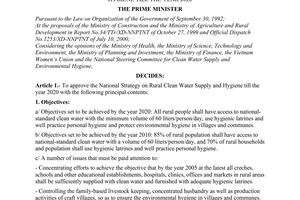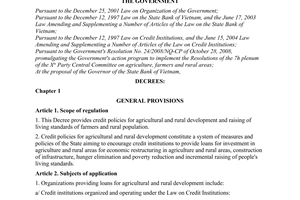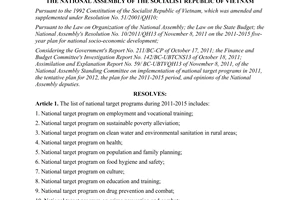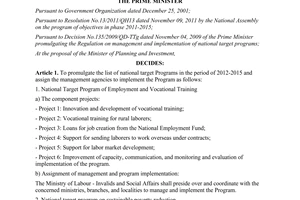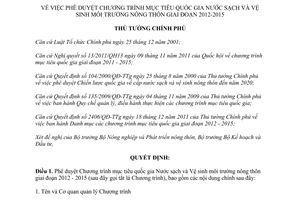Nội dung toàn văn Decision No. 366/QD-TTg on approving the national target program on rural clean
|
THE
PRIME MINISTER |
SOCIALIST REPUBLIC OF VIETNAM |
|
No.: 366/QD-TTg |
Hanoi , March 31, 2012 |
DECISION
ON APPROVING THE NATIONAL TARGET PROGRAM ON RURAL CLEAN WATER AND ENVIRONMENTAL SANITATION, PHASE 2012-2015
THE PRIME MINISTER
Pursuant to the December 25, 2001 Law on Organization of the Government;
Pursuant to the November 9, 2011 Resolution No. 13/2011/QH13 of the National Assembly on the national target programs, phase 2011-2015;
Pursuant to Decision No. 104/2000/QD-TTg of August 25, 2000 of the Prime Minister approving the national strategy on rural clean water supply and sanitation till 2020;
Pursuant to Decision No. 135/2009/QD-TTg of November 4, 2009 of the Prime Minister promulgating the Regulation on management and administration of national target programs implementation;
Pursuant to Decision No. 2406/QD-TTg of December 18, 2011 of the Prime Minister promulgating List of national target programs, phase 2012-2015;
At the proposals of the Minister of Agriculture and Rural Development, Minister of Planning and Investment,
DECIDES:
Article 1. Approving the national target program on Rural Clean Water and Environmental Sanitation, phase 2012 - 2015 (hereinafter referred to as Program), including the following main contents:
1. Name and Management Agency of the Program
a) Name of Program: National Target Program on Clean Water and Rural Environmental Sanitation, phase 2012-2015.
b) Management Agency of the Program: the Ministry of Agriculture and Rural Development.
2. Conception and steering principles for Program implementation
a) Conception:
- Stepping up the socialization and development of clean water markets and rural environmental sanitation services in accordance with national socio-economic development situation.
- Promoting the whole society’s internal resources to implement the Program, basing on the characteristics of each region, local and the needs of users in order to select technology scale and service level which consistent with the financial capacity, management, exploitation and use works after investment. Enlisting and using effectively the capital resource of donors, ensuring the participation of the community.
- Priority support to the poor, poor areas; areas with special difficulties, frequent droughts, pollution, and mountainous, coastal and island regions.
b) The guiding principles:
- The implementation of the Program shall be associated with socio-economic development plan, national strategy on clean water supply and rural sanitation till 2020, contributing into the national target program on new rural construction till 2020; ensuring that constructions for clean water supply and rural environmental sanitation, once repaired, upgraded or newly constructed shall operate steadily and bring into efficiently in the condition of climate change; ensuring safety clean water supply.
- To develop technologies being appropriate for regions; beside the development of advanced technology, it should care about development of water supply technologies at households scale in areas with difficulties.
- To increase hygiene target, promote investment in household’s hygiene, in which stepping up types of low-cost sanitation through credit in order to increase the accessibility of the poor.
- To strengthen information - education – communication work, change from the awareness raising communication to the behavior change communication.
3. Objectives and key tasks of the Program
a) General objectives:
Gradually to realize National strategy on rural clean water supply and environmental sanitation till 2020, improve condition of the water supply, sanitation, raise awareness, change hygiene behavior and reduce environmental pollution, contribute in enhancing health and life quality for rural people.
b) Specific objectives:
To achieve the following major objectives by the end of 2015:
- Water supply: 85% of rural population use hygienic living water, in which 45% shall use water attaining to QCVN 02-MOH standard with the minimum volume of 60 liters/person/day; and 100% of nursery schools, general education schools and commune health stations in rural areas have adequate clean water.
- Environmental sanitation: 65% of rural households have hygienic latrines, 45% of breeding farmers have hygienic breeding- facilities and 100% of nursery schools and general education schools, commune health stations in rural areas have adequate hygienic latrines.
4. Subjects and scope of the Program implementation
All people in rural areas in whole country, with priority support to the poor, deep-lying and remote areas, ethnic minorities, border and island regions, areas that are polluted and meet difficulty in water source.
5. Implementation period
The Program shall be implemented from 2012 to 2015.
6. Total capital, capital structure and support mechanisms for implementation of the Program, and list of projects of the Program
a) Total capital: 27,600 billion VND
b) Capital structure:
- The central budget: 4,100 billion VND, hold 14.9%
- Local budget: 3,100 billion VND, hold 11.2%
- International aid: 8,200 VND billion, hold 29.7%
- Preferential Credit: 9,100 billion VND, hold 33.0%
- Capital from people and private sources: 3,100 billion VND, hold 11.2%
c) Projects of the Program:
- Project 1: Clean water supply and rural environment
+ Target: 85% of rural population use hygienic water, 45% in which use water of QCVN 02-MOH standard with the minimum volume of 60 liters / person / day and 100% nursery schools and general education schools (main campuses) in rural areas have adequate clean water and well used and managed, sanitary latrines; 45% of breeding farmers have hygienic breeding- facilities.
+ Fund for the implementation: 19,725 billion VND.
+ The component sub-projects:
. Sub-project 1: living water supply, including: Built living water supply constructions for rural areas, border guard stations combined with residential clusters in border route and prisons, giving priority for areas with special difficulty of water sources: mountainous, saline areas, arsenic, dioxin and other toxic contaminated areas.
. Sub-project 2: Built clean water constructions and hygienic latrines for nursery schools, general education schools.
. Sub-project 3: Build hygienic breeding- facilities.
+ Assignment of implementation:
. Line agency: the Ministry of Agriculture and Rural Development.
. Management and implementation agencies: the Ministry of Agriculture and Rural Development direct the implementation of sub-projects 1 and 3; the Ministry of Education and Training direct the implementation of sub-project 2; People's Committees of provinces and cities implement projects in respecting area.
. Coordinating agencies: Ministries of: Health, Construction, Natural Resources and Environment, Science and Technology, Defense, Public Security; Committee for Ethnic Minorities, Vietnam Institute of Science and Technology, Vietnam Farmers' Association, Vietnam Women's Union, the Central Committee of Ho Chi Minh Communist Youth Union.
Project 2: Rural Sanitation:
+ Target: 65% of rural households have hygiene latrines and 100% of commune health stations have adequate clean water and hygiene latrines that are well managed and used.
+ Fund for the implementation: 5,961 billion VND.
+ The component sub-projects:
. Sub-project 1: Build household hygiene latrines.
. Sub-project 2: Build clean water construction and hygiene latrines for commune health stations.
+ Assignment of implementation:
. Line agencies: the Ministry of Health.
. Management and implementation agencies: the Ministry of Health directs the implementation; People's Committees of provinces and cities organize the implementation of projects in respecting areas.
. Coordinating agencies: Ministries of: Agriculture and Rural Development, Natural Resources and Environment, Science and Technology, Education and Training; Committee for Ethnic Minorities, Vietnam Institute of Science and Technology, Vietnam Farmers' Association, Vietnam Women's Union, the Central Committee of Ho Chi Minh Communist Youth Union.
- Project 3: Enhancing capacity, communication, supervising and evaluating of implementation of the Program.
+ The contents of activity: Training for enhancing capacity for the system of the sector; informing - educating - communicating and enhancing awareness, changing of behavior for all levels, sectors and communities; supervising - evaluating the implementation of the Program; controlling water quality; review and update the planning; developing and transferring technology; operating and maintaining constructions.
+ Fund for the implementation: 1,914 billion VND.
+ Assignment of implementation:
. Line agencies: the Ministry of Agriculture and Rural Development.
. Management and implementation agencies: The Ministries of Agriculture and Rural Development, Health, Education and Training to organize and direct the implementation of assigned sub-projects; People's Committees of provinces and cities organize the implementation of projects in respecting areas
. Coordinating agencies: Ministries of: Information and Communications, Natural Resources and Environment, Science and Technology; Vietnam Institute of Science and Technology, Vietnam Farmers’ Association, Vietnam Women's Union, the Central Committee of Ho Chi Minh Communist Youth Union.
d) Capital mobilization mechanism:
- To diversify capital sources:
+ To integrate the fund sources of national target programs, targeted supporting projects and programs in the area, including:
. Direct capital supports for the national target program on rural clean water and environmental sanitation in 2012-2015 period.
. Integrated capital from other targeted supporting programs and projects on clean water supply and environmental sanitation being deployed in rural areas.
+ To mobilize the maximum of local resources (at provincial, district and commune level) in order to organize deployment of the Program, the People's Committees of provinces and cities allocated from local budgets at least 10% of total capital for the implementation of the Program in its local.
+ To mobilize investment capital from enterprises and individuals for constructions being capable of directly retrieving capital; enterprises are entitled to The State's Development Investment Credit Loans; to implement the November 9, 2010 Decision No. 71/2010 / QD-TTg of Prime Minister on the Regulation on pilot investment in the public-private partnership form.
+ The contributions from the people according to regulations for each specific project.
+ International aids.
+ To effectively using credit capital sources: credit under the Prime Minister’s Decision No. 62/2004/QD-TTg of April 16, 2004; trade credit capital as stipulated in the Decree No. 41/2010/ND-CP of April 12, 2010 of the Government on credit policy for agriculture and rural.
+ To mobilize other legal financial sources.
- Support mechanisms:
The principle of support mechanism is ensuring sufficient capital for investment deployment and costs for operating, use in order to assure sustainable operation of the construction. Level of support and balance rate of each capital source must match the objects of regions, types of constructions in order to ensure the poor in deep-lying and remote areas may access to and use constructions of water supply and sanitation. Details as followed:
+ For development investment capital:
For the concentrated water supply constructions:
The central budget capital: to support at a maximum 90% for the communes meeting with extremely difficulties in ethnic minorities and mountainous areas, submerged coastal and island areas, boundary communes as prescribed by the Prime Minister; 60% for delta communes and 75% for other rural communes.
Local budget capital and capital mobilized from other legal sources (preferential credits, private investment and contributions of people): make sure the remaining funding amount to implement. For localities being likely to balance their budget, areas being likely for socialization, should attract at the maximum of community and private sector participation.
. For retail small water supply works: The state budget supports up to 70% for poor households, families under special policy and up to 35% for near-poor households; other households are entitled to use preferential credit loans as prescribed.
. For water supply and sanitation in schools, health stations: The state budget supports up to 90%. For units without income source, the provincial People's Committee shall consider and decide the level of investment from the state budget.
+ For non-business capital:
. The following activities receive 100% support from the state budget: capacity enhancing training, information - education - communication, inspection, supervising and evaluating the implementation situation and control of water quality, planning, technology transfer applications, supporting base network...,
. Regarding to construction of hygienic latrine and breeding-facilities models (including biogas), in order to replicate, the state budget supports 70% for poor households, households under special policy and 35% for near-poor households; other households using loans from preferential credit.
+ The specified capital allocation criteria:
To assign The Ministry of Agriculture and Rural Development to assume the prime responsibility for formulating and approving the capital allocation mechanisms and criteria for each specific component and project after asking the opinions of the Ministry of Finance, the Ministry Planning and Investment and the Ministry of Health.
- Investment management mechanism:
+ Investors of construction projects is the direct management and exploitation operation unit of works. If the direct management and operation unit show its incompetence, provincial People's Committees shall consider and decide to assign other qualified units to be the investors.
+ During the process of investment preparation, must acquired comments of local community on investment projects or economical-technical reports and the commitment of water use and payment by households.
+ Selection of contractors: The selection of contractors shall comply with current regulations; encourage forms of assigning simple technical work items to communities directly benefit from the construction, carry out if these communities are capable to do so.
+ Communal monitoring board composed of representatives of the communal People's Councils, the communal Fatherland Front and social organizations and elected representatives of the community directly benefit from projects to supervise the works in accordance with current regulations on investment supervision by the Community.
7. The main solutions for Program implementation
a) The specific mechanisms and policies must be promulgated
The Ministry of Agriculture and Rural Development shall assume the prime responsibility for and coordinate with the relating ministries and branches to review, amend and supplement the provisions on financial management, technology, preferential and encouraging policies for building investment and managing rural clean water supply constructions, technical regulations of the constructions, guidance on the management, exploitation and protection of constructions in order to create favorable conditions for the implementation of the Program; review, establish coordination mechanisms among ministries, branches and localities for the effective and right-targeted implementation of the Programs.
b) Information - education - communication:
To carry our information - education - communication activities in the followings main forms:
- Direct communication at village level to train the team of communicators in the village and the people.
- Newspaper, radio and television are primarily used at the national level and in localities.
- Social marketing to promote demand of building and use hygienic latrines, practice of hygiene behaviors; use clean water for living and hygienic latrine building.
- Improve responsibility of authorities, sectors, branches and mass organizations at all levels in implementing operation the Program.
c) To expand international cooperation relationship:
To stepping up international cooperation for interchange of experience, sharing information, transferring technology and mobilizing non-refundable aids and preferential credit loans.
Establish a clear and flexible coordination mechanism between governmental agencies and donors in order to create a transparent, convenient and effective environment for implementing the Program; boost activities in partnership from Vietnam side with donors in the field of clean water supply and environmental sanitation in rural areas.
Efficiently use capital of donors and ensure the implementation in accordance with the committed agreements.
d) Post-investment management:
To attach importance to post-investment results, particularly interested in models and mechanisms of management of centralized water supply works, public works; strongly adjust operation mode from serving to service, taking needs of the customers to change service providing style of the investment and operation management unit.
Regarding to completed construction, must create operating procedures, in which clearly defined time, sequence and contents of maintenance, repair and replace buildings and equipments.
Management officers must be trained and possess professional qualifications, fully capable of managing and operating as prescribed.
The price of clean water must accurately and precisely cover the reasonable cost factors in the clean water production and distribution process, tax and profit, and shall be submitted to the provincial People's Committee to decide and issue in accordance with the current provisions. Where the consumption price is lower than cost price, the competent level deciding consumption price shall subsidy for water supply units the difference amount from local budgets.
e) Human resources, science and technology:
- Human resources:
To attach importance to training and developing human resource, which particularly focuses on capacity enhancing training for state management cadres and civil servants at all levels, the non-business and service organizations, and especially grassroots collaborators.
Training content shall be appropriate for each group of subjects, including propaganda and timely guidance of legal documents, compilation of scheming – planning, science and technology, project construction investment and management, task of communication, management of projects exploitation and operation...
The types of training: training, sightseeing to learn experience, seminars... To use positive training method which the trainees are the centre.
- Science and technology:
+ Water supply: Focus on finding appropriate and efficiency technological and technical solutions, especially for areas in special difficult conditions (areas of frequent droughts, floods, pollution, high mountains, islands ... ). Diversify technology types of rational exploitation and use of water resources; improve water quality in accordance with regional natural and socio-economic conditions, ensuring principle of sustainability. Taking advantage of stable water sources in areas meeting with special difficulties is priority; centralize water supplying for areas with crowed and gathered residents; upgrade and expand the existing water supply constructions; ensure water quality.
+ Sanitation: Based on natural conditions and custom of each locality to select appropriate type of latrine.
+ For breeding waste treatment technology: Focus primarily on breeding waste treatment at households scale with traditional technology, in which give priority to application of breeding waste treatment technology by Biogas technology.
e) The participation of the community
Strengthen participation of the community, ensuring creating favorable and equal opportunities for people to benefit and participate in the activities of the Program actively and positively. The implementation of the Program shall be associated with the implementation of grassroots democracy regulations, encourage village meetings to determine local’s priorities and decide on issues related to clean water and environmental sanitation in rural areas.
8. Organization of implementation
a) At central level:
- The Minister of Agriculture and Rural Development shall issue Decision on establishment of Management Board of national target program on Rural Clean Water and Environmental Sanitation for 2012 – 2015 phase; Members of the Management Board include: the Minister of Agriculture and Rural Development as the chairman, Vice Minister of Agriculture and Rural Development as standing Vice Chairman, Vice Minister of Health as Vice Chairman, members of the Management Board are representatives of the leader of Ministries of Planning and Investment, Finance, Construction, Education and Training, Defense, Natural Resources and Environment, Science and Technology, Information and Communication; Committee for Ethnic Minorities, Vietnam Farmers' Association, Vietnam Women's Union, Central Committee of Ho Chi Minh Communist Youth Union.
- The Operation Regulations of the Management Board shall be decided by the Chairman.
- A standing office located at the Ministry of Agriculture and Rural Development to assist the Management Board. Depending on the nature of each component project in the Program, the agency assigned to implement a component project may establish a Project Management Unit and such establishment shall be decided by the heads of the agency implementing project.
b) At local level
President of provincial-level People's Committee shall decide to establish an Executive Board of the National Target Program on Rural Clean Water and Environmental Sanitation in 2012 – 2015 period to implement the Program in the respecting area. Chairman of the Board is the head of the provincial People's Committee; Vice Chairman is the Head of Department of Agriculture and Rural Development, Vice Chairman is the head of Department of Health. Other members of the Executive Board are representatives of head of relating provincial-level agencies and organizations.
Article 2. This decision takes effect from the date of signing.
Article 3. Ministers, heads of ministerial-level agencies, heads of other central agencies, heads of government- attached agencies, presidents of provincial-level People’s Committees shall be responsible for implementation and direct their subsidiary agencies and units to implement this Decision. /.
|
|
THE
PRIME MINISTER |
------------------------------------------------------------------------------------------------------
This translation is made by LawSoft,
for reference only. LawSoft
is protected by copyright under clause 2, article 14 of the Law on Intellectual Property. LawSoft
always welcome your comments
